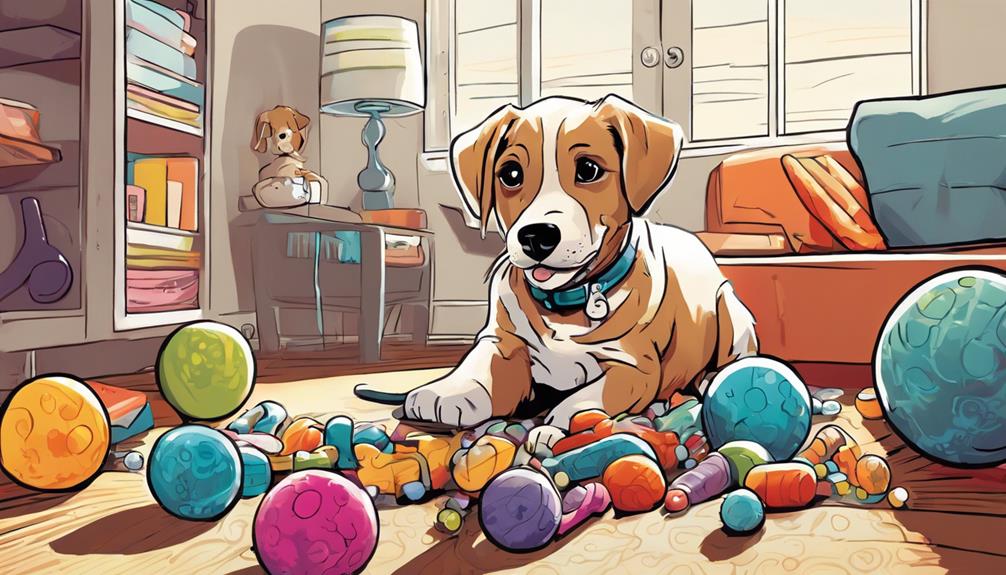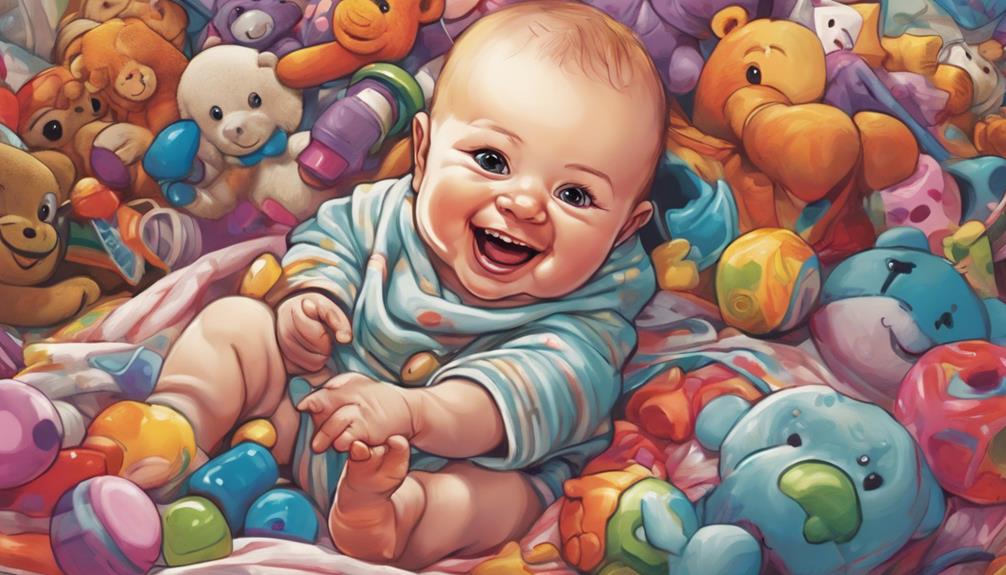Puppies usually lose their baby teeth between 3.5 to 4 months old. You'll notice this transformation occurs as their adult teeth start to emerge, generally around 12 weeks. During this time, your puppy might display signs of teething, like increased chewing, drooling, or even some discomfort. It's important to keep an eye on your pup's dental health during this phase. If you see no baby teeth lost by 4 months, it could indicate a dental issue. Keeping informed about your puppy's teething journey will help keep their mouth healthy, and there's more to discover about caring for their teeth. Understanding why dogs lose baby teeth is important for pet owners. The process of losing baby teeth is necessary for adult teeth to come in properly, ensuring your dog has a healthy and strong set of teeth. Additionally, being aware of the signs of teething and taking appropriate measures can help alleviate any discomfort your puppy may experience during this phase.
Key Takeaways
- Puppies typically lose their baby teeth between 3.5 to 4 months of age, with larger breeds potentially losing them sooner.
- Permanent teeth begin to emerge around 12 weeks, coinciding with the loss of baby teeth.
- By 6 months, all 42 adult teeth should be in place, requiring monitoring to prevent dental issues.
- If no baby teeth are lost by 4 months, it may indicate dental problems that need attention.
Teething Timeline for Puppies

The teething timeline for puppies starts when they begin to develop their baby teeth around 3-4 weeks of age. By 6-8 weeks, your puppy will have a full set of 28 baby teeth. This initial teething process is vital as it sets the stage for the shift to adult teeth.
Around 12 weeks, the emergence of permanent teeth begins, and your puppy will start to lose their baby teeth around 3.5 to 4 months old. As your puppy approaches this age, you'll want to keep an eye on them. Large and giant breed puppies tend to lose their baby teeth sooner than smaller breeds, sometimes waiting until 4-5 months to shed theirs.
Monitoring the teething process is essential because if baby teeth don't fall out naturally by six months, it can lead to dental issues. Ultimately, your puppy will have all 42 adult teeth by 6-7 months of age. Understanding this timeline helps you be prepared for any challenges that may arise during the teething process.
Signs Your Puppy Is Teething

Noticing certain signs can help you determine if your puppy is teething, usually starting around 3.5 to 4 months of age.
One of the most noticeable signs is increased chewing behavior. Puppies often chew on toys or household items to alleviate teething pain and discomfort from their erupting teeth.
You might also observe red and inflamed gums, which signal that the permanent teeth are coming in. Along with this, increased drooling is common; you may find your puppy leaving wet spots on the floor or their toys. Sometimes, you might even see small blood spots on their favorite chew items, indicating the pressure on their gums.
Additionally, changes in appetite or mood can occur during this period. Your puppy may show signs of discomfort, such as whining or pawing at their mouth.
These behaviors are all typical as your puppy navigates the challenges of teething. Being aware of these signs will help you provide the appropriate support and care to ease your puppy's teething pain, ensuring they remain comfortable and happy during this vital developmental stage.
Understanding Puppy Chewing Behavior

Chewing serves as a natural outlet for puppies to cope with teething discomfort and explore their surroundings. When your teething puppy starts losing those baby teeth around 12 weeks, you'll notice an increase in their chewing behavior. This is their way of alleviating the discomfort caused by sharp baby teeth making way for larger, permanent ones. As puppies are around this age, they often seek relief by chewing on various objects.
Providing appropriate teething toys is vital. These toys help redirect their chewing behavior from your furniture to safe alternatives, preventing destructive habits. Dental chews can also support oral health while satisfying your puppy's urge to chew. Remember, it's normal for teething puppies to experience irritation, leading to that intense chewing phase.
You might also notice more frequent puppy bites during this period. It's important to guide them towards suitable options, ensuring they don't resort to your shoes or cables. By understanding your puppy's chewing behavior, you'll be better equipped to support their teething process and keep your home intact.
Safe Chew Toys for Teething Puppies

Choosing safe chew toys for your teething puppy is essential to ensuring their comfort and protecting their developing teeth. Look for toys made from soft, durable materials that are non-toxic to prevent injury. Flexible rubber toys are a great choice; they bend without breaking, reducing the risk of dental damage that can occur with harder objects like bones or nylon toys.
To cater to your puppy's preferences, provide a variety of textures in their chew toys. This can help them find comfort during the teething process. Freezable toys, such as KONGs filled with treats or simple rubber toys, can also soothe sore gums when chilled, offering extra relief.
Remember to practice regular rotation of the chew toys. This not only keeps your teething puppy engaged but also encourages them to choose appropriate items instead of household objects or furniture.
Managing Teething Discomfort

Teething can be a tough time for your puppy, but there are effective ways to help manage their discomfort. As your puppy begins to lose their baby teeth around 3.5 to 4 months, providing a variety of safe chew toys is vital. Soft rubber or dental rings can alleviate teething pain while keeping your puppy engaged.
Incorporating cold items, like frozen teething toys or chilled fruits and vegetables, can also soothe sore gums and reduce inflammation. These methods not only help comfort your puppy but also redirect their chewing behavior away from household items.
Remember, consistent supervision is important during this period. Puppies often find creative ways to chew, so monitoring their behavior helps guarantee they stick to appropriate chew toys and avoid potential hazards.
Chewing behavior will likely continue until they're about 6 months old, so keep those teething toys handy.
Common Dental Issues in Puppies

When it comes to your puppy's dental health, you should be aware of common issues like retained deciduous teeth.
If those baby teeth stick around too long, they can cause misalignment and even bite problems.
Regular vet check-ups can help catch these issues early, ensuring your pup has a healthy mouth as they grow.
Retained Deciduous Teeth
Retained deciduous teeth can cause significant dental problems in puppies, leading to discomfort and misalignment if not addressed promptly. This issue is particularly common in small breeds, where baby teeth may linger longer than they should. Typically, puppies lose their baby teeth around 3.5 to 4 months, but if any retained deciduous teeth remain after six months, it's time to consult your veterinarian.
These retained teeth can trap food particles, increasing the risk of periodontal disease and other dental issues. Regular check-ups are essential for monitoring your puppy's teething process and ensuring that any retained teeth are dealt with efficiently.
| Issue | Description |
|---|---|
| Duration | Baby teeth should fall out by six months. |
| Common Breeds | Small and brachycephalic breeds are most affected. |
| Risks | Trapped food can lead to periodontal disease. |
| Solution | Veterinary intervention may be necessary. |
Taking action early can prevent more serious complications down the line. Stay vigilant and keep your puppy's dental health in check for a happier, healthier life!
Misalignment and Bite Issues
Misalignment and bite issues often arise in puppies, particularly in those with retained deciduous teeth, leading to discomfort and potential long-term dental problems.
Small and brachycephalic breeds are especially prone to these issues, often resulting in retained upper canine teeth. When these teeth aren't lost as they should be, they can create improper jaw alignment, causing pain and difficulty chewing.
Malocclusion from misaligned teeth not only affects your puppy's ability to eat but can also lead to excessive wear on certain canine teeth. The trapped food debris around these misaligned teeth increases the risk of periodontal disease, which can further complicate your puppy's dental health.
To mitigate these risks, veterinarians frequently recommend the extraction of retained teeth during spay or neuter procedures. This proactive approach helps prevent future dental complications and guarantees your puppy develops a healthy bite.
Caring for Adult Dog Teeth

Caring for your adult dog's teeth is vital to preventing dental issues and ensuring a happy, healthy life. As a responsible dog owner, you should establish a teeth cleaning routine that includes brushing your dog's teeth several times a week. Use dog-friendly toothpaste and brushes to make the process enjoyable for both you and your pup.
Regular dental cleanings are essential for adult dogs, as they help prevent plaque buildup that can lead to periodontal disease if left untreated. Additionally, consider incorporating dental chews into your dog's diet. Products like OraVet can greatly reduce tartar buildup and promote healthy gums, enhancing your dog's overall oral hygiene.
It's also important to handle your dog's mouth frequently from a young age. This practice can make brushing easier and more effective as they grow.
Don't forget about the importance of annual professional dental cleanings by a veterinarian. These check-ups provide a thorough assessment of your dog's oral health and help prevent serious dental problems. By prioritizing your dog's dental care, you'll contribute to their well-being and longevity.
When to Consult a Veterinarian

When you notice signs of dental issues in your puppy, like discomfort while eating or unusual swelling in the gums, it's time to consult a veterinarian.
If your puppy hasn't started losing baby teeth by 4-5 months, don't hesitate to seek advice about potential retained teeth.
Keeping an eye on their oral health early on can prevent bigger problems down the line.
Signs of Dental Issues
Several signs can indicate your puppy may be experiencing dental issues, and recognizing them early can help guarantee their health and comfort.
Pay close attention to persistent bad breath; it's often one of the first signs that something's wrong. Excessive drooling can also signal dental problems, so keep an eye on how much your puppy is drooling compared to normal.
Red gums are another clear indicator of potential issues. If you notice any inflammation or swelling, it's time to consult your veterinarian. Additionally, if your puppy shows any signs of pain, like whining or pawing at their mouth, they might be dealing with underlying dental issues that need assessment.
Be mindful of any difficulty your puppy has while eating or chewing food, as this can point to discomfort or misalignment of their teeth. If you see visible tartar buildup or abnormal tooth alignment during the teething process, seeking veterinary intervention is essential.
Early detection of these signs can help prevent more serious complications down the line, ensuring your puppy's teeth remain healthy and strong.
Delayed Tooth Loss
Monitoring your puppy's tooth loss is important, especially if they haven't started losing baby teeth by 4 months old, as this could signal delayed tooth loss and potential dental issues. If your puppy has retained teeth by 6 months, it's vital to consult a veterinarian, as these can lead to misalignment and other dental problems. Small breeds and brachycephalic puppies are particularly prone to these issues, so keep an eye on their dental development.
Here's a quick reference table to help you understand when to consult a veterinarian regarding delayed tooth loss:
| Age (Months) | Signs to Watch For | Action to Take |
|---|---|---|
| 4 | No loss of baby teeth | Monitor closely |
| 6 | Retained baby teeth | Consult a veterinarian |
| Ongoing | Signs of discomfort or pain | Schedule a dental check-up |
Early intervention by your veterinarian can prevent long-term dental complications associated with delayed tooth loss. Staying vigilant about your puppy's dental health can guarantee a bright future with a healthy smile.
Frequently Asked Questions
Which Puppy's Teeth Fall Out First?
When you observe your puppy, you'll notice the incisors are the first to fall out. They usually start loosening between 4-5 months, followed by the canine teeth shortly after. Keep an eye out for this!
What Are the Worst Weeks for Puppy Teething?
The most challenging weeks for your puppy's teething journey usually fall between 4 to 6 months. You'll notice increased chewing and some fussiness as they navigate this uncomfortable phase. Keep an eye on their comfort levels!
Will My Puppy Stop Biting When He Loses His Baby Teeth?
Your puppy might not stop biting entirely after losing baby teeth. Some will still chew due to exploration instincts or teething discomfort. Consistent training and redirection are essential to manage ongoing biting behaviors effectively.
At What Age Do Puppies Stop Teething?
Puppies usually stop teething around six months old. By then, they've replaced their baby teeth with adult ones. You might notice less chewing and biting as they adjust to their new permanent teeth.
At What Age Do Puppies and Dogs Start Losing Their Baby Teeth?
Puppies and dogs start losing their baby teeth at around 4 to 6 months of age. This process, known as “when do dogs lose their baby teeth,” allows adult teeth to come in. It’s important to provide appropriate chew toys and regular dental care during this time to ensure healthy teeth and gums.
Conclusion
In summary, understanding your puppy's teething journey helps you support their change to adulthood.
As they lose those tiny baby teeth, you might feel like you're raising a miniature wolf with an insatiable urge to chew everything in sight!
By providing safe chew toys and managing their discomfort, you'll guarantee their dental health remains in tip-top shape.
Remember, if you ever have concerns, don't hesitate to consult your veterinarian for guidance.
Your pup's smile is worth it!









